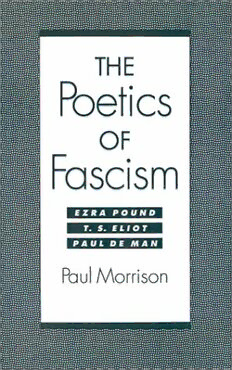
The Poetics of Fascism: Ezra Pound, T.S. Eliot, Paul de Man PDF
188 Pages·1996·12.593 MB·English
Most books are stored in the elastic cloud where traffic is expensive. For this reason, we have a limit on daily download.
Preview The Poetics of Fascism: Ezra Pound, T.S. Eliot, Paul de Man
Description:
Morrison examines the legacy of the modernist poetics of Ezra Pound and T.S. Eliot, as it relates to current theoretical orthodoxies, and traces its influence on the current crisis in post-structural literary theory. Morrison reads the politics of post-structural theory in relation to the socio-cultural arguments espoused in the poetry and prose by Pound and Eliot, and reveals a continuity between that theory and high modernism's tendency towards fascism. Without reducing the political implications of poetry to mere caricature and without slighting the force and fact of literary mediation, Morrison has produced a book that will reshape the discussion of the social dimension of modernism. He concludes with a provocative analysis of deconstruction and the work of Paul de Man, and makes a case for a new post-structural theory that can accommodate history.
See more
The list of books you might like
Most books are stored in the elastic cloud where traffic is expensive. For this reason, we have a limit on daily download.
